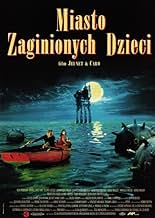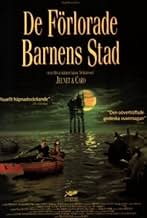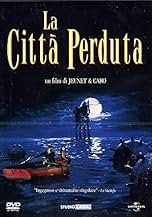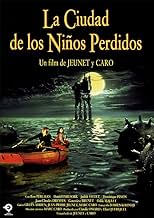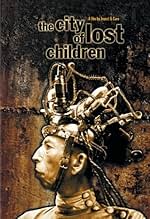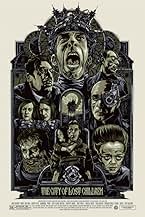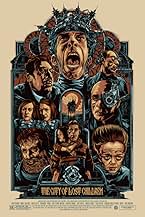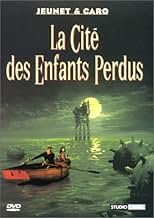A scientist in a surrealist society kidnaps children to steal their dreams, hoping that they slow his aging process.A scientist in a surrealist society kidnaps children to steal their dreams, hoping that they slow his aging process.A scientist in a surrealist society kidnaps children to steal their dreams, hoping that they slow his aging process.
- Awards
- 5 wins & 14 nominations total
Geneviève Brunet
- La Pieuvre
- (as Genevieve Brunet)
Mapi Galán
- Lune
- (as Mapi Galan)
Briac Barthélémy
- Bottle
- (as Briac Barthelemy)
Léo Rubion
- Jeannot
- (as Leo Rubion)
Featured reviews
Many disagree with the previous reviewer.
Not sure what the last reviewer watched, but City of lost Children is amazing cinema from the sets, color, acting, lighting, plot, it had everything pushed to the Nth from what I experienced.
It is NOT a typical American style movie. It is French and luckily, they are allowed to have an alternate path to interesting movie making.
This guy Jeunet puts a LOT into all of his productions. Almost a mentally overwhelming amount of style, info and actions (not action packed, but activities that go on in or behind the scene). He also did Amelie which is just as astounding and one of the best films ever made. Watch it start to finish if you don't believe that.
The City of Lost Childen extends its name sake across many peoples from the twisted characters that are adults and act like the children they never were, to the children who are lost from being children and must be adults. Not to mention the abductions and the reason for that.
So it is a win on many levels. One of the best, and I am so grateful I happened across this bazaar gem of a flick.
Wish more movies were as intricately entertaining as this art piece is.
Not sure what the last reviewer watched, but City of lost Children is amazing cinema from the sets, color, acting, lighting, plot, it had everything pushed to the Nth from what I experienced.
It is NOT a typical American style movie. It is French and luckily, they are allowed to have an alternate path to interesting movie making.
This guy Jeunet puts a LOT into all of his productions. Almost a mentally overwhelming amount of style, info and actions (not action packed, but activities that go on in or behind the scene). He also did Amelie which is just as astounding and one of the best films ever made. Watch it start to finish if you don't believe that.
The City of Lost Childen extends its name sake across many peoples from the twisted characters that are adults and act like the children they never were, to the children who are lost from being children and must be adults. Not to mention the abductions and the reason for that.
So it is a win on many levels. One of the best, and I am so grateful I happened across this bazaar gem of a flick.
Wish more movies were as intricately entertaining as this art piece is.
The City of Lost Children gets two platinum stars and also moves up to one of my top ten favorite films of all time. This is a confusing story, from beginning to end it expands your mind, reaches into your nightmares, and creates a story that is part Dark City and part of a novel called "The Golden Compass" by Phillip Pullman.
Yes, this film was everything and more. Not only visually beautiful, but the creative and symbolic meaning of the actions and words of the characters are "jaw dropping". Also, there are so many sub-stories in this film that reminded me of the style that Run Lola Run was done. This is the style that due to a connection of unrelated events something extraordinary happens. Let me give you an example from this film: There is a scene where the girl and One (Ron Pearlman-also a very biblical name) are trying to escape from the two women who want their jewels. There are events that lead from a dog finding its female companion to a boat almost hitting/splitting the women in half. Wild coincidences...imagine this times ten, and you have this film.
Keep in mind this is a French film with English subtitles, so you are not only getting the true voice of the film, but seeing the darkness of the cinematography without any American input. This really shows the purpose behind making this film, it really takes you to a new place so dark and dreamlike that you the viewer actually feel like you are in the picture itself. A movie about dreams and nightmares that takes place in a world of dreams and nightmares.
Overall, a heavily religious and symbolic film, The City of Lost Children should be put at the top of your foreign film list. Put it in your DVD player, open your mind, and be ready for a wild and intense ride!!
Grade: ***** out of *****
Yes, this film was everything and more. Not only visually beautiful, but the creative and symbolic meaning of the actions and words of the characters are "jaw dropping". Also, there are so many sub-stories in this film that reminded me of the style that Run Lola Run was done. This is the style that due to a connection of unrelated events something extraordinary happens. Let me give you an example from this film: There is a scene where the girl and One (Ron Pearlman-also a very biblical name) are trying to escape from the two women who want their jewels. There are events that lead from a dog finding its female companion to a boat almost hitting/splitting the women in half. Wild coincidences...imagine this times ten, and you have this film.
Keep in mind this is a French film with English subtitles, so you are not only getting the true voice of the film, but seeing the darkness of the cinematography without any American input. This really shows the purpose behind making this film, it really takes you to a new place so dark and dreamlike that you the viewer actually feel like you are in the picture itself. A movie about dreams and nightmares that takes place in a world of dreams and nightmares.
Overall, a heavily religious and symbolic film, The City of Lost Children should be put at the top of your foreign film list. Put it in your DVD player, open your mind, and be ready for a wild and intense ride!!
Grade: ***** out of *****
The evil Krank (Daniel Emilfork), his dwarf wife and his clone minions children (Dominique Pinon) have a machine to steal the dreams of young children because Krank can't have dreams himself. One (Ron Perlman) is a strong man performer whose little brother Denree is kidnapped by Krank's underlings, the Cyclops. Miette (Judith Vittet) is a young street kid who ends up helping him.
This has a lot of weird concepts on display. I can only describe this a outlandish mix of Dickensian poverty and a french grimy Jules Verne sci-fi with a good helping of weird surrealism. The visual is a good unique grim fairy tale but the story drags a little too much. It meanders and is confused. It is in love with its visual surrealism more than trying to make sense with the story. It should be a lot more simpler than what it is. It spends a lot of time luxuriating in the weirdness of the world and the villain.
This has a lot of weird concepts on display. I can only describe this a outlandish mix of Dickensian poverty and a french grimy Jules Verne sci-fi with a good helping of weird surrealism. The visual is a good unique grim fairy tale but the story drags a little too much. It meanders and is confused. It is in love with its visual surrealism more than trying to make sense with the story. It should be a lot more simpler than what it is. It spends a lot of time luxuriating in the weirdness of the world and the villain.
I can't help myself: I adore this film. I freely accept that it's not going to be everyone's cup of tea; if pushed, I might even accept that it's not perfect. But there's no film I love more, or more enjoy re-watching. One caveat though: I've seen both the subtitled and the dubbed print, and the English dubbing frankly comes close to ruining the movie. Ron Perlman dubs himself and is fine, and some of the other adult English actors are perfectly OK, though they tend to be blander than the French originals. But most of the children are terrible, and with her own voice it's Judith Vittet's extraordinary performance (all the more extraordinary considering she was nine at the time) that helps give "La Cité" the genuine emotional centre that some viewers don't feel it has.
But I'll come back to that. In any version, at least Jeunet and Caro's astonishing visual flair and artistry come over. I can't think of a film that has such a concentration of memorable shots - time and again, especially watching on DVD with a freeze-frame facility, you realize how many beautiful compositions Jean-Pierre Jeunet gives us: though the cast of characters could easily fill a freak show, and the sets are dark and quite unglamorous in themselves, the cinematography is gorgeous and the mise-en-scène often strangely elegant. It has a look all of its own, perfect for a modern, urban fairy-tale. The music too is gorgeous, one of the finest scores by David Lynch's regular musical collaborator, Angelo Badalamenti.
"Fairy tale" is I think the best generic starting-point for this film, so long as you think Grimm rather than Disney. (Unlike "Delicatessen", it isn't really a comedy, though it has comic elements). And the plot works according to its own logic, even if the progression from scene to scene is occasionally a bit lumpy or obscure. Krank (the astonishing Daniel Emilfork), grown prematurely old because he cannot dream, uses a cult of blind, messianic preachers to abduct children from a decaying industrial port and steal their dreams - but they have only nightmares, and Krank falls ever deeper into despair and evil. It's up to the orphan pickpocket Miette and a none-too-brainy circus strongman, One, to put a stop to him. This rich idea is elaborated with all sorts of visual conceits and eccentric characters - Jeunet mounts, for example, a couple of astonishing sequences in which chains of unlikely effects proceed from the smallest of causes - but never at the expense of the central relationship of One and Miette.
In a sense Miette, like Krank, has grown old too fast: the orphaned street-children of this city are savvy and unsentimental, and never seem to have had a childhood; meanwhile there's something deeply childish, in various ways, about most of the adults. Sensitively directed and never overacting, Judith Vittet's Miette gradually thaws, and Ron Perlman brings a lot of sympathy and pathos to what could have been an oafish, cartoonish role: Jeunet gives plenty of space and subtlety to their gradually-developing friendship, and dares to do what I suspect no English director would dare to do at the moment, which is to make their relationship innocently sexualized. Neither of them is really a grown-up, but it's still an extremely risky move, exploring the first stirrings of pre-pubescent sexuality while trying not to be exploitative or prurient. I do think the film pulls it off, though I can imagine some viewers feeling distinctly uncomfortable with it. For me it's one of the most convincingly unsentimental and nuanced (if mannered) portrayals of childhood I've ever seen on the screen, and there is real compassion and tenderness along the way, as well as some darker twists and turns.
It's a film that rewards analysis if you're prepared to surrender to its strange world with its strange rules. But it rewards the senses and the emotions too - and it radiates love of cinema as the perfect medium for sophisticated fantasy. One elderly actress who appears towards the end (Nane Germon) acted - as Jeunet's DVD commentary points out - in Jean Cocteau's "La Belle et la Bête" about fifty years earlier (there are, by the way, distinct references to the Beauty and the Beast story here), and "La Cité des enfants perdus" deserves to join that film as one of the classic cinematic fairy-tales. Pity about Marianne Faithfull over the closing credits, though!
But I'll come back to that. In any version, at least Jeunet and Caro's astonishing visual flair and artistry come over. I can't think of a film that has such a concentration of memorable shots - time and again, especially watching on DVD with a freeze-frame facility, you realize how many beautiful compositions Jean-Pierre Jeunet gives us: though the cast of characters could easily fill a freak show, and the sets are dark and quite unglamorous in themselves, the cinematography is gorgeous and the mise-en-scène often strangely elegant. It has a look all of its own, perfect for a modern, urban fairy-tale. The music too is gorgeous, one of the finest scores by David Lynch's regular musical collaborator, Angelo Badalamenti.
"Fairy tale" is I think the best generic starting-point for this film, so long as you think Grimm rather than Disney. (Unlike "Delicatessen", it isn't really a comedy, though it has comic elements). And the plot works according to its own logic, even if the progression from scene to scene is occasionally a bit lumpy or obscure. Krank (the astonishing Daniel Emilfork), grown prematurely old because he cannot dream, uses a cult of blind, messianic preachers to abduct children from a decaying industrial port and steal their dreams - but they have only nightmares, and Krank falls ever deeper into despair and evil. It's up to the orphan pickpocket Miette and a none-too-brainy circus strongman, One, to put a stop to him. This rich idea is elaborated with all sorts of visual conceits and eccentric characters - Jeunet mounts, for example, a couple of astonishing sequences in which chains of unlikely effects proceed from the smallest of causes - but never at the expense of the central relationship of One and Miette.
In a sense Miette, like Krank, has grown old too fast: the orphaned street-children of this city are savvy and unsentimental, and never seem to have had a childhood; meanwhile there's something deeply childish, in various ways, about most of the adults. Sensitively directed and never overacting, Judith Vittet's Miette gradually thaws, and Ron Perlman brings a lot of sympathy and pathos to what could have been an oafish, cartoonish role: Jeunet gives plenty of space and subtlety to their gradually-developing friendship, and dares to do what I suspect no English director would dare to do at the moment, which is to make their relationship innocently sexualized. Neither of them is really a grown-up, but it's still an extremely risky move, exploring the first stirrings of pre-pubescent sexuality while trying not to be exploitative or prurient. I do think the film pulls it off, though I can imagine some viewers feeling distinctly uncomfortable with it. For me it's one of the most convincingly unsentimental and nuanced (if mannered) portrayals of childhood I've ever seen on the screen, and there is real compassion and tenderness along the way, as well as some darker twists and turns.
It's a film that rewards analysis if you're prepared to surrender to its strange world with its strange rules. But it rewards the senses and the emotions too - and it radiates love of cinema as the perfect medium for sophisticated fantasy. One elderly actress who appears towards the end (Nane Germon) acted - as Jeunet's DVD commentary points out - in Jean Cocteau's "La Belle et la Bête" about fifty years earlier (there are, by the way, distinct references to the Beauty and the Beast story here), and "La Cité des enfants perdus" deserves to join that film as one of the classic cinematic fairy-tales. Pity about Marianne Faithfull over the closing credits, though!
10presence
The City of Lost Children is my all time favorite movie. It is unlike anything I've ever seen or experienced before. It's a movie that I hold dear to my heart and will never forget. I have to be honest though, the first time I saw this movie, I really didn't like it at all. The story was too confusing, and the characters were extremely weird and twisted. After watching it a second and third time, however, I understood what was going on more, and could spend more time looking at the visuals rather than the subtitles. Speaking of visuals, this movie has it in spades. The environment that Jean-Pierre Jeunet created is out of this world. The city is very dark and the water looks as if there are secrets hidden within. The mood the soundtrack sets is perfect for the scenery and the superb acting by everybody (including the kids) just adds to the greatness of this flick. I highly recommend this movie, it's one of those movies that you will never forget watching, and the images will stay in your head for a very long time. A beautiful, beautiful, movie. 10/10
Did you know
- TriviaTo achieve the slightly skewed color scheme of the movie, the actors were made up in white face and the color palette corrected until they were flesh-toned.
- GoofsThe words from The Original that Miette remembers in flashback (after she receives Uncle Irvin's dream message) differ slightly from what The Original actually said, although the point of the message is still the same.
- Quotes
[after Mlle. Bismuth has been harpooned]
Clone: Does it hurt?
Mlle. Bismuth: Yes, I'm allergic to steel.
- Alternate versionsThere are two different audio tracks for the film - one is the original French language version and another is an English language dub.
- ConnectionsFeatured in Les enfants de la cité perdue (1995)
- SoundtracksWho Will Take Your Dreams Away
Music by Angelo Badalamenti
Lyrics by Marianne Faithfull
Performed by Marianne Faithfull
Details
- Release date
- Countries of origin
- Official sites
- Languages
- Also known as
- La ciudad de los niños perdidos
- Filming locations
- Production companies
- See more company credits at IMDbPro
Box office
- Budget
- $18,000,000 (estimated)
- Gross US & Canada
- $1,738,611
- Opening weekend US & Canada
- $34,348
- Dec 17, 1995
- Gross worldwide
- $1,784,338
Contribute to this page
Suggest an edit or add missing content


